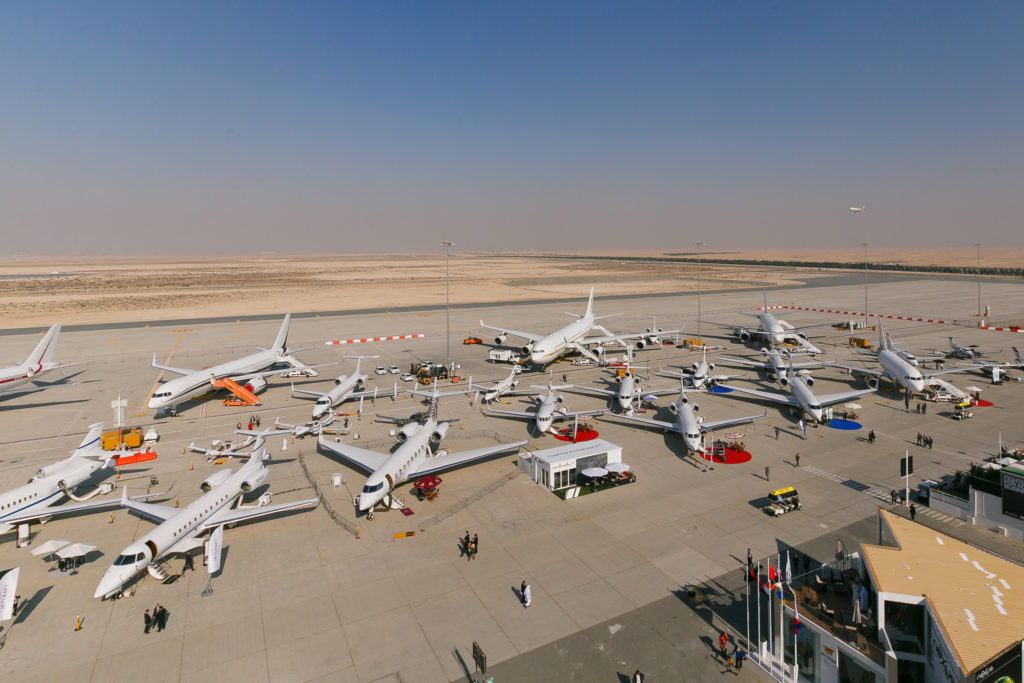During the end of last year, Ali Ahmed Alnaqbi, founding and executive chairman of the Middle East and North Africa Business Aviation Association predicted that in 2020 the business aviation sector in the Middle East and North Africa region, which includes the United Arab Emirates, would achieve a growth rate of around 9%, higher than the global growth estimate of 4 – 6%, with the UAE as the sector leader in the region.
“2020 will be a milestone in the history of business aviation and private aviation in the Middle East region in general, and the UAE in particular,” Alnaqbi said back in December 2019.
Alnaqbi’s prediction of a historic year for business aviation wasn’t wrong, but it has been for reasons no one could have ever foreseen. When the Covid-19 pandemic struck throughout the world in March, it left much of the industry in a tailspin. But despite the fallout that most in the industry have felt since the chaotic arrival of Coronavirus, many business aviation companies in the UAE are confident that the Middle East and North Africa (MENA) region will recover strongly. Reports of flights at almost 50% ahead of normal in August 2020 show that the recovery trend is well-established.
“Currently, many countries still have travel restrictions in place due to Covid-19. However, we have witnessed increasing movements to India, Maldives and Europe,” explains Holger Ostheimer, managing director, DC Aviation Al-Futtaim. “They are primarily traveling for holidays, repatriation and business.”
“MENA is an interesting region with the UAE, Saudi Arabia, Morocco, Egypt and others being the busiest markets,” notes Issa Zuriqi, commercial director at business aviation services and FBO-provider, Hadid. “Being headquartered in Dubai, we would note that the busiest regions within the country are Dubai and Abu Dhabi, which are major destinations for trade, business and tourism.
“Dubai International Airport is amongst the world’s busiest airports in terms of passenger traffic and air freight movements while Abu Dhabi International Airport is an increasingly popular hub for commercial aviation activities.”
Year-round destination
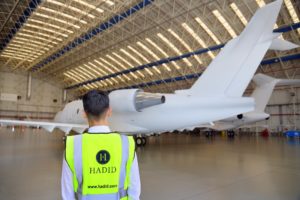
Many are unaware that the UAE is a year-round destination, with numerous travelers visiting in the hottest months for both business and tourism.
“Over the years and prior to Covid-19, year in, year out, there has been an increase in business aviation activities from late August to late April,” explains Zuriqi. “Being a provider of services to a diverse international clientele, we see a strong surge in leisure enquiries towards major events hosted in Dubai.”
“However, ongoing restrictions with regards to Covid-19 testing are deterring tourists from traveling and the postponement of Expo 2020 Dubai has meant a downturn in expected flight numbers to the region this year,” adds Ostheimer. “Dubai International Airport is the biggest hub for business aviation. However, we are seeing strong interest in Al Maktoum International Airport because of its strategic location between Dubai and Abu Dhabi and because it has less traffic and less slot restrictions,” says Zuriqi.
“Apart from being home to a number of fixed-based operators, Al Maktoum Airport is also home to the Mohammed Bin Rashid Aerospace Hub, which was purpose-built to cater for private jets of all types. Interestingly, Al Bateen Airport is one to watch with its significant increase in flights,” he adds.
Reshaping travel
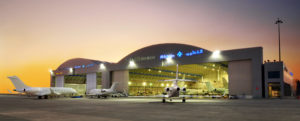
Al Maktoum International Airport, which is located at Dubai South, formerly known as Dubai World Central
Covid-19 is without doubt reshaping the way people travel and this has brought new opportunities for business and private aviation in the UAE. “Passengers who generally travel in first and business class are now looking to charter aircraft to avoid busy airports and being stuck on an aircraft with other people,” says Ostheimer. “We are also seeing new enquiries for aircraft purchases. Some high-net-worth individuals are seriously looking to buy their own aircraft, and have it leased out for charter when they are not using it.”
With an increase in private jet enquires, it’s important to know what to remember when planning a trip to the UAE. “Currently for business aviation there are no requirements for passengers entering other than having a valid visa and a valid negative Covid-19 test,” says Ostheimer. “Passengers from 30 countries require a Covid-19 test on arrival and they are required to quarantine until they receive their test results. Crew are only required to fill a declaration and to have their temperature taken.”
A strong future
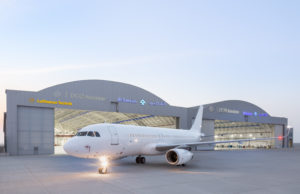
When looking towards the future of business aviation in the UAE, there’s a sense of optimism among operators despite how the year has unfolded so far.
“It is no secret that Covid-19 has been one of the worst crises to hit global aviation. However, throughout the pandemic, business aviation continued to provide important services to communities such as repatriations and the transportation of health workers and critical medical supplies. Business aviation operations are adaptable and quicker off the ground. By and large, we feel that business aviation has been able to leverage the flexibility of its operations and personalized approach,” explains Zuriqi.
Ostheimer agrees, “While Covid-19 has had the commercial aviation industry in a tailspin, private and business aviation are showing signs of a faster recovery. The fact that people are seriously looking at business aviation as a viable mode of transportation is an encouraging sign for us.”
“The pandemic quickly changed aviation in unforeseen and unprecedented ways, driving non-stop demand for flight permits and planning for alternative routes due the changes in country specific restrictions and regulations,” says Zuriqi. “As providers of aircraft charter services, we have found that there is an increase in the volume of new clients who had not previously accessed private flights.
“Some operators are reporting a better summer season in 2020 compared the same period last year. This can be attributed to private aviation’s higher sense of safety and service efficiency, along with high-net-worth clients having new cost and value justifications.
“We believe the UAE will be the highest contributor in terms of business aviation and logistics movements for the coming years,” adds Zuriqi. “The MEBAA Show is fast approaching and we, like many of our peers, feel it is an excellent platform for the aviation community to discuss realities of the industry, how to overcome the immediate challenges and how organizations can synergize to contribute to the recovery of the industry globally.”
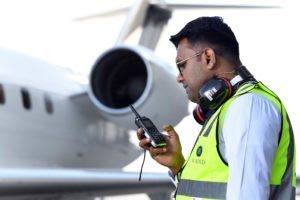
Business aviation operators are surprisingly optimistic about the future with many believing they will emerge stronger from the Covid-19 pandemic. Zuriqi says, “Despite the pandemic-related challenges, business aviation is set to lead the recovery of the aviation industry. Hadid works closely with operators. They are optimistic about the future, especially with the increase of aircraft registrations, the prioritizing of safe practices, the increase in volume of new users of private aircraft and the continued infrastructure expansion and developments to support the Expo.
“The overall outlook for business aviation in the UAE is positive, despite the impact of the pandemic. The business and private aviation industry is very niche, it caters to 1% of ultra-high-net-worth individuals in the world. There will always be aircraft that need management, maintenance or even hangarage and require our services and expertise. Dubai will continue to attract high-net-worth and ultra-high-net-worth individuals who represent a certain level of activity in terms of aircraft ownership or private-jet movements.
“As Shekih Mohammed bin Rashid Al Maktoum has said himself, we are not building the largest airports in the world, we are building the aviation capital of the world. It is clear the growth ambitions of the authorities and leadership alike fully support the growth of business aviation in the UAE.”


